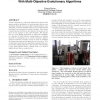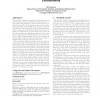1209 search results - page 76 / 242 » New Robotics: Design Principles for Intelligent Systems |
AAAI
1997
13 years 10 months ago
1997
Difficult real-time AI problems require a means for expressing multi-dimensional and dynamic goal criteria and a principled model for satisficing to best meet the criteria. In the...
ATAL
2006
Springer
14 years 1 months ago
2006
Springer
Layered architectures are a proven principle for the design of software systems and components. The paper introduces a layered reference architecture for software agents which assi...
GECCO
2007
Springer
2007
Springer
Optimising the flow of experiments to a robot scientist with multi-objective evolutionary algorithms
14 years 3 months ago
A Robot Scientist is a physically implemented system that applies artificial intelligence to autonomously discover new knowledge through cycles of scientific experimentation. Ad...
ESAW
2000
Springer
14 years 28 days ago
2000
Springer
Abstract. Software engineering describes a system at different levels of abstraction. Agent-oriented software engineering introduces a new level, called the agent level, to allow t...
ATAL
2010
Springer
13 years 8 months ago
2010
Springer
The problem of multi-robot patrol in adversarial environments has been gaining considerable interest during the recent years.In this problem, a team of mobile robots is required t...


